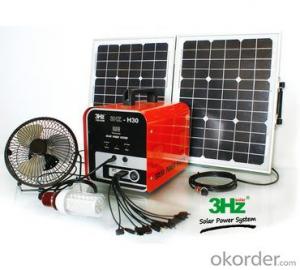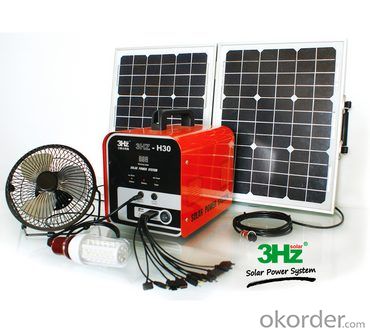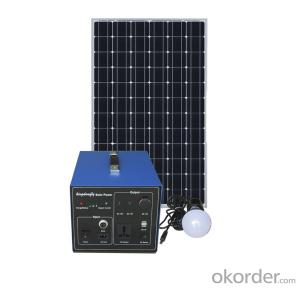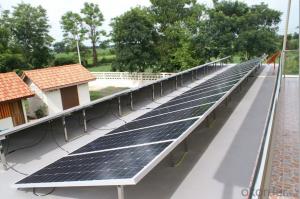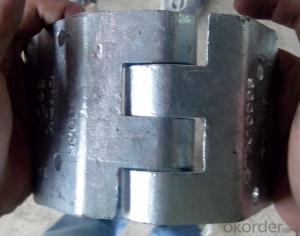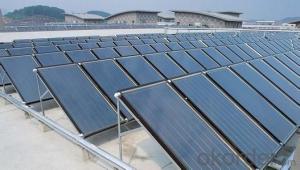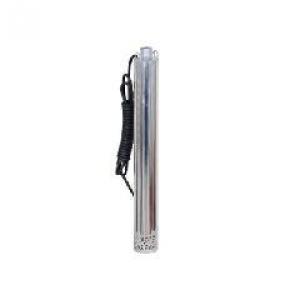Wholesale Solar Power Systems
- Loading Port:
- Guangzhou
- Payment Terms:
- TT OR LC
- Min Order Qty:
- -
- Supply Capability:
- 2000 unit/month
OKorder Service Pledge
OKorder Financial Service
You Might Also Like
Power isn’t always available where and when you need it. Whether you’re hiking in the mountains, camping in the woods, or just plain trying to get away from it all, you need a portable power supply to keep your electronic devices working. Now more than ever, we are dependent on our energy hogging devices to help us live. There’s plenty of free solar power from the sun, so we carry a variety of portable solar power packs to keep you connected. When you need a portable power supply, think of 3HZ-SOLAR!
Our specialty is portable solar power packs, so let us know if you have a special request or question. It’s sometimes hard to know how much power you need for your application. Most of our portable solar power packs require a few extras to charge from the sun, so be sure to check out our complete solar kits. Otherwise, our portable power supply items can be charged from the wall or car. To be truly free, you’ll want to use solar, though.
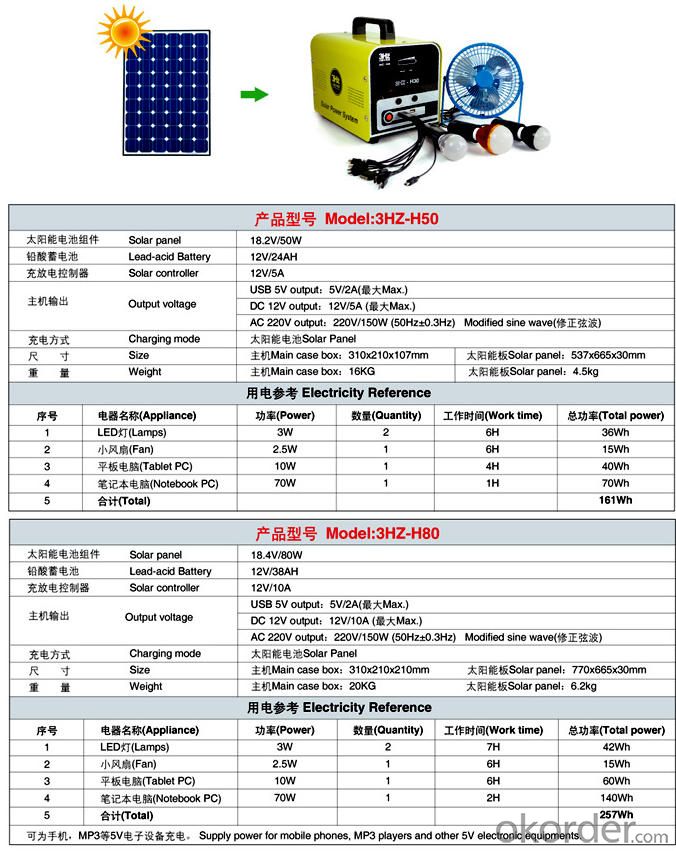
- Q: How do solar energy systems impact energy storage technologies?
- Solar energy systems have a significant impact on energy storage technologies by increasing the demand for efficient and scalable storage solutions. As solar power generation depends on sunlight availability, energy storage technologies help bridge the gap between peak solar production and peak energy demand, enabling a more reliable and flexible energy supply. This has spurred advancements in battery technology, grid-scale storage, and innovative storage solutions, ultimately driving the growth and integration of renewable energy sources into the grid.
- Q: Are there any disadvantages to installing a solar energy system?
- Yes, there are a few disadvantages to installing a solar energy system. Some of the main drawbacks include the high upfront cost of installation, the need for sufficient sunlight to generate optimal power, and the requirement for ample space to accommodate the solar panels. Additionally, solar energy systems can be less efficient during cloudy or rainy periods, and their production may not align with peak energy demands. Finally, the maintenance and occasional replacement of components can be costly and time-consuming. Despite these disadvantages, the long-term benefits and environmental advantages of solar energy make it an increasingly popular and viable option for many households and businesses.
- Q: Can solar energy systems be used in powering data centers?
- Data centers can indeed use solar energy systems to generate power. Many data centers worldwide are adopting solar energy as a renewable and sustainable power source. The availability of ample sunlight in certain regions makes solar energy an attractive option for powering energy-intensive facilities like data centers. Solar energy systems comprise solar panels that convert sunlight into electricity. These panels can be installed on data center rooftops or surrounding areas to produce clean and environmentally friendly energy. The electricity generated can be utilized to power various data center operations, including servers, cooling systems, and lighting. One significant advantage of employing solar energy in data centers is the potential for cost savings. By generating their own electricity, data centers can reduce their reliance on the power grid and lower energy bills. Furthermore, some regions offer incentives and tax benefits for investing in renewable energy sources, further easing the financial burden. Additionally, solar energy systems can contribute to the overall sustainability of data centers. By utilizing a renewable energy source, data centers can substantially reduce their carbon footprint and environmental impact. This aligns with the global focus on reducing greenhouse gas emissions and combating climate change. However, it is crucial to consider the scalability and reliability of solar energy systems when powering data centers. Data centers consume significant amounts of power and require a consistent and uninterrupted energy supply. To address this, data centers can incorporate energy storage solutions, such as batteries, to store excess energy generated during the day and use it during periods of low sunlight or high demand. In conclusion, solar energy systems are an effective means of powering data centers. They provide a sustainable and cost-effective alternative to traditional energy sources while contributing to environmental preservation. As the demand for data centers continues to rise, integrating solar energy can play a vital role in establishing a more sustainable and resilient digital infrastructure.
- Q: Are there any risks of electrical malfunction or failure with solar energy systems?
- Yes, there are some risks of electrical malfunction or failure with solar energy systems. These can include issues such as faulty wiring, damage to solar panels, or inverter failures. Additionally, extreme weather conditions like lightning strikes or power surges can also pose a risk. However, proper maintenance, regular inspections, and adherence to safety guidelines can help mitigate these risks and ensure the safe and efficient functioning of solar energy systems.
- Q: How do solar energy systems impact job creation?
- Solar energy systems have a significant positive impact on job creation. The installation and maintenance of solar panels require skilled workers, leading to the creation of employment opportunities in the renewable energy sector. Additionally, the growth of the solar industry stimulates job creation in related fields such as manufacturing, research, and development. The shift towards solar energy not only contributes to a cleaner environment but also fosters economic growth by generating jobs at various stages of the solar energy supply chain.
- Q: Can solar energy systems be used for powering off-grid eco-farms?
- Yes, solar energy systems can definitely be used for powering off-grid eco-farms. Solar panels can be installed to harness sunlight and convert it into electricity, which can then be used to power various farm operations such as irrigation systems, lighting, ventilation, and machinery. This renewable energy source is ideal for off-grid eco-farms as it reduces dependence on fossil fuels, minimizes environmental impact, and offers a sustainable solution for meeting energy needs in remote farming locations.
- Q: What is the impact of snow or hail on solar panels?
- Snow or hail can have a significant impact on the performance and efficiency of solar panels. When snow accumulates on the surface of the panels, it can block sunlight from reaching the photovoltaic cells, reducing the system's energy production. This reduced sunlight exposure can lead to a decline in the overall power output of the solar installation. Similarly, hail can cause physical damage to the panels if the ice pellets are large enough or the velocity of their impact is high. This damage can result in cracks, shattered glass, or even internal structural issues within the panels. Once the solar panels are damaged, their ability to convert sunlight into electricity is compromised, leading to a decrease in their overall efficiency. To mitigate the impact of snow or hail on solar panels, various measures can be taken. In snowy areas, panels can be installed at an angle to allow snow to slide off more easily, reducing the accumulation on the surface. Additionally, heating elements can be integrated into the panels to melt the snow and ice. However, these heating systems require additional energy, which may offset some of the benefits of solar power during snowy periods. For hail, the use of tempered or impact-resistant glass for solar panels can help to minimize the damage caused by hailstones. Furthermore, mounting systems that provide a level of flexibility and shock absorption can help to absorb the impact and reduce the risk of physical harm to the panels. Overall, while snow and hail can have negative effects on solar panels, proper installation, maintenance, and protective measures can help to mitigate these impacts and ensure that the solar system continues to generate clean and renewable energy efficiently.
- Q: What is the impact of electromagnetic interference on the performance of solar panels?
- Electromagnetic interference can have a negative impact on the performance of solar panels. It can disrupt the proper functioning of the panels, causing fluctuations in the power output and reducing the efficiency of the system. This interference can be caused by nearby electronic devices or power lines, and can lead to decreased energy production and potential damage to the panels. Implementing appropriate shielding and mitigation techniques is crucial to minimize the impact of electromagnetic interference on the performance and longevity of solar panels.
- Q: How does a solar thermal system convert sunlight into heat?
- A solar thermal system converts sunlight into heat through the use of solar collectors. These collectors, often made of glass, capture the sun's rays and transfer the energy to a heat transfer fluid or directly to water in the system. The fluid or water then carries the heat to a storage tank or heat exchanger, where it can be used for various purposes such as heating water, spaces, or even generating electricity.
- Q: Are solar energy systems expensive?
- Solar energy systems can be initially expensive to install, but they provide long-term cost savings and are becoming more affordable over time.
Send your message to us
Wholesale Solar Power Systems
- Loading Port:
- Guangzhou
- Payment Terms:
- TT OR LC
- Min Order Qty:
- -
- Supply Capability:
- 2000 unit/month
OKorder Service Pledge
OKorder Financial Service
Similar products
Hot products
Hot Searches
Related keywords
